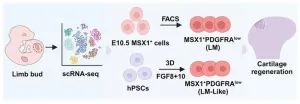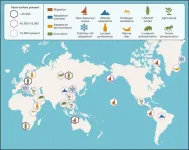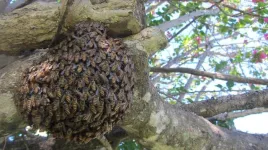(Press-News.org) CHAPEL HILL, N.C. – The Chan Zuckerberg Initiative (CZI) announced four multi-year Exploratory Cell Networks grants for researchers exploring the frontiers of genomics, cell biology, and synthetic biology by developing new measurement technologies. The projects will be bringing together regional labs in California, the Mid-Atlantic, and the Research Triangle.
Klaus Hahn, PhD, the Ronald G. Thurman Distinguished Professor of Pharmacology and member of the UNC Lineberger Comprehensive Cancer Center, will be co-leading a project titled, “Research Triangle: Revealing the Hidden Topologies of the Human Kinome” with Scott Soderling, PhD, a cell biologist at Duke University and Albert Keung, PhD, a chemical and biomolecular engineer at North Carolina State University.
Each of the three institutions will receive a million dollars, awarded over three years, with potential extension into future years. The three investigators share leadership of this effort, which is made possible by interlocking the diverse technologies of their labs.
The Triangle groups will focus on the “kinome”, a set of over 500 proteins that function as “molecular switches” crucial to nervous system function, neurological disease, and a range of non-neurological disorders. p38 kinases, for example, respond to stress stimuli and are involved in cognitive and emotional functions, including anxiety, neurodegeneration, and high-level decision making.
Much work has led to an understanding of specific kinases and how they function. Because kinases work together as members of large circuits, it is also important for researchers to see how they affect one another and operate as a whole.
An image of a cell that won honorable mention in the Nikon Small World competition. Credit: Hahn Lab
This is the goal of the new project — which combines the Keung lab’s ability to map out the connections and interactions among many kinases, the Soderling lab’s ability to understand how these connections are placed and act within the brain, and the Hahn lab’s ability to see and control kinase activities in real time to understand how transient activation events regulate the circuitry.
The researchers are developing new tools to correlate information about these different aspects of kinase behavior, and to study kinases at scale inside the neural system of a living organism (in vivo). The Keung lab is creating new instruments and molecular screening approaches to provide precise, quantitative information about which kinases interact and how fast and tight these interactions are.
The Soderling group will probe kinase activities in living brains, examining which of these potential interactions occur during specific behaviors. The Hahn lab will develop capabilities to stop or start kinases in live brains, and to visualize their activation in real time. This information will be brought together by Soderling at Duke using an integrated computational model of the human kinome.
This multi-faceted research project, which includes tool development, experimental application and modeling, has implications for tackling many other types of proteins and other high-dimensional cell biological problems, spanning multiple human diseases. The ultimate goal of this project is to identify new therapeutic targets in the brain, and to generate novel diagnostic tools that report and interpret dynamic changes in the human kinome.
About the Chan Zuckerberg Initiative
The Chan Zuckerberg Initiative was founded in 2015 to help solve some of society’s toughest challenges — from eradicating disease and improving education, to addressing the needs of our local communities. Through collaboration, providing resources and building technology, our mission is to build a more inclusive, just, and healthy future for everyone. For more information, please visit www.chanzuckerberg.com.
About UNC School of Medicine
The UNC School of Medicine (SOM) is the state’s largest medical school, graduating more than 180 new physicians each year. It is consistently ranked among the top medical schools in the US, including 5th overall for primary care by US News & World Report, and 6th for research among public universities. More than half of the school’s 1,700 faculty members served as principal investigators on active research awards in 2021. Two UNC SOM faculty members have earned Nobel Prize awards.
# # # #
END
WASHINGTON — Researchers have developed an all-light communication network that enables seamless connectivity across space, air and underwater environments. The new network design combines different types of light sources to ensure connectivity no matter the environment.
“In today’s world, data transmission is critical for communication, navigation, emergency response, research and commercial activities,” said research team leader Yongjin Wang from Nanjing University of Posts and Telecommunications and ...
COLUMBUS, Ohio – The likelihood that a girl will participate in high school sports in the United States is driven not so much by individual choice, new research suggests. Instead, decisions made by parents, the wealth of one’s family and community, and racial dynamics matter.
By combining interviews with elite college athletes and analysis of data on over 4,000 high school girls, researchers found that socioeconomic status – of families and the school districts in which they live ...
A new study from a team of McGill University and Vanderbilt University researchers is shedding light on our understanding of the molecular origins of some forms of autism and intellectual disability.
For the first time, researchers were able to successfully capture atomic resolution images of the fast-moving ionotropic glutamate receptor (iGluR) as it transports calcium. iGluRs and their ability to transport calcium are vitally important for many brain functions such as vision or other information coming from sensory organs. Calcium also brings about changes in the signalling capacity of iGluRs ...
Artificial Intelligence has helped scientists reveal a new form of aggressive prostate cancer which could revolutionise how the disease is diagnosed and treated in the future.
A Cancer Research UK-funded study published today, 29 February 2024, reveals that prostate cancer, which affects one in eight men in their lifetime, includes two different subtypes termed evotypes.
The discovery was made by an international team led by the University of Oxford, and the University of Manchester, who applied AI (artificial intelligence) on data from DNA to identify two different subtypes affecting the prostate.
The team hope their findings could save thousands ...
Osteoarthritis (OA) is a debilitating joint disease which affects over 500 million people worldwide, with trends increasing as populations age. OA is caused by progressive, irreversible degeneration of joint cartilage, leading to pain, swelling and immobility in the affected joint. Current therapies focus on symptom relief but cannot restore degenerated cartilage.
A potentially alternative treatment is the regeneration of cartilage from stem cells. Importantly, not all types of stem cells can make cartilage and earlier clinical trials with mesenchymal stem or stromal cells (MSCs) obtained did not convincingly show that MSCs make new cartilage when given to OA patients. In search for the ...
Writing a commentary in the 50th anniversary issue of Cell, FU Qiaomei and E. Andrew Bennett, both of the Institute of Vertebrate Paleontology and Paleoanthropology (IVPP) of the Chinese Academy of Sciences, explored the contribution of paleogenomics to our understanding of the evolution of modern humans.
Given her numerous contributions to the field of human evolution through the analysis of both archaic and early modern human genomes, Prof. FU was invited by the journal Cell to write a commentary reviewing what we have learned about the evolution ...
Climate change is increasing the frequency and intensity of severe weather events, which may particularly endanger vulnerable populations such as the elderly. Researchers from Mass General Brigham and colleagues examined how weather disasters between 2011 and 2016 influenced healthcare delivery and mortality among Medicare beneficiaries in affected counties, finding that one week after major weather events, emergency department (ED) use and mortality remained elevated by 1.22% and 1.4%, respectively, from pre-disaster ...
For more than a decade, invasive Asian honeybees have defied evolutionary expectations and established a thriving population in North Queensland, much to the annoyance of the honey industry and biosecurity officials.
Research published today in Current Biology has shown the species, Apis cerana, has overcome what is known as a genetic bottleneck to grow from a single swarm into a population of more than 10,000 colonies over a 10,000 square kilometre area – which is about the size of Greater Sydney.
Co-lead author Dr Rosalyn Gloag from the University of Sydney School of Life and Environmental Sciences said: “Our study of this bee population shows that some species can ...
Several areas of the globe — including the Bay of Bengal, the Philippines, and the Caribbean Sea — are likely to experience record-breaking average surface air temperatures in the year period up to June 2024 as a result of the ongoing El Niño phenomenon. The modelling results, published in Scientific Reports, also suggest that there is an estimated 90 percent chance of record-breaking global mean surface temperatures occurring over the same period under a moderate or strong El Niño scenario.
The El Niño-Southern Oscillation, centred ...
About The Study: This study of 536 participants identified changes in patient portal use over time and highlighted populations that had lower access to health information. The COVID-19 pandemic was associated with an increase in portal use. Sociodemographic disparities by sex and age were reduced, although disparities by health literacy widened. A brief validated health literacy measure may serve as a useful digital literacy screening tool to identify patients who need further support.
Authors: Esther Yoon, Ph.D., M.P.H., M.S., of Northwestern University in Chicago, is the corresponding ...






